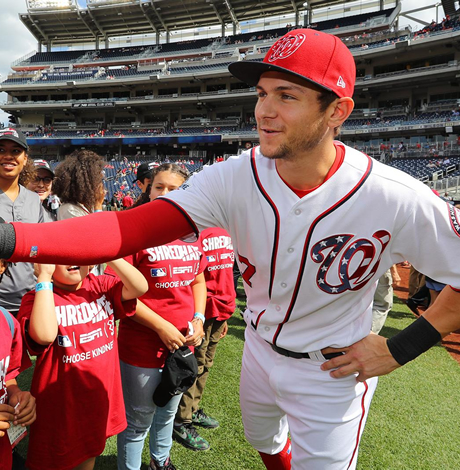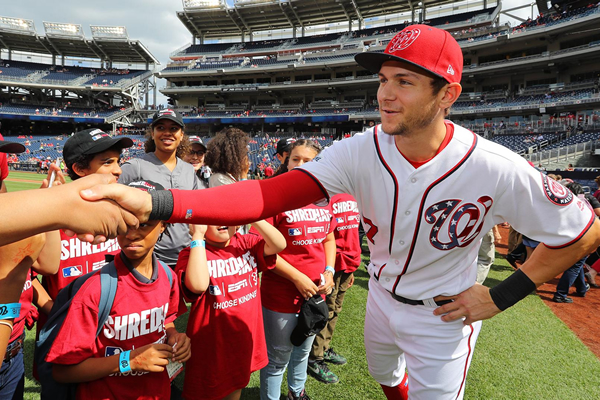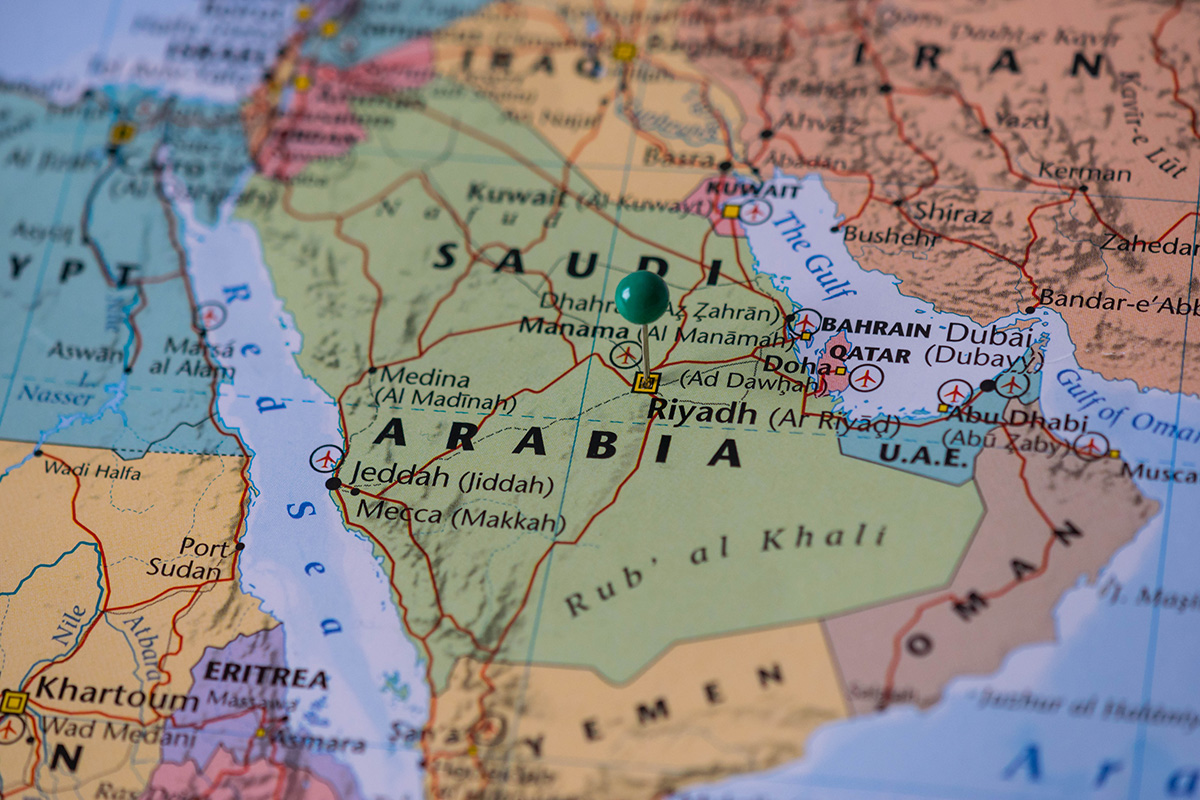Sports
MLB targets bullying with ‘Shred Hate’ program
11 D.C. schools participate in first year of project


Washington Nationals shortstop Trea Turner meets school kids participating in the Shred Hate program on the field at Nationals Stadium. (Photo courtesy MLB)
On May 23, about 250 students from 11 D.C. public and charter schools met Washington Nationals shortstop Trea Turner at Nationals Stadium, and about 25 of them joined Turner on the field shortly before the start of the game between the Nationals and the San Diego Padres.
In addition to talking about baseball, Turner talked to the middle and high school students about a subject he said he knows about personally – bullying and a program sponsored by Major League Baseball and the ESPN TV sports network to prevent bullying in the nation’s schools.
“I think two things,” Turner told the students, according to a joint statement released by the Nationals and MLB. “Be yourself, you are who you are and be proud of it,” he said. “And rely on your friends and your family.”
As the students listened intently, Turner added, “A lot of people that bully or whatever it may be, people that don’t know you, classmates or a lot of stuff is from people who don’t know you and what your values and morals are.”
Joining Turner in the gathering with the students that day was Billy Bean, a gay former Major League Baseball player who now serves as MLB’s Vice President for Social Responsibility and as Special Assistant to MLB Commissioner Rob Manfred.
The students’ visit with Turner and Bean at Nationals Park and the invitation they received to watch the Nationals game that day was part of a new program launched in January 2017 by Major League Baseball, ESPN, and ESPN’s X-Games sports competition called Shred Hate.
The Shred Hate program included visits by school kids to the ballparks in three participating cities during its first-year launch – D.C., Chicago, and Minneapolis. But the major component of the program took place in the approximately 35 schools in those cities along with others in Colorado that were selected for the 2017-2018 school year.
A non-profit San Francisco-based organization called No Bully, which has been training schools on how to put in place bullying prevention and eradication efforts for more than a decade, has been retained by MLB and ESPN to carry out the Shred Hate program in the selected schools.
“The No Bully System is a set of interventions to prevent and stop bullying and cyberbullying in school and after school programs,” according to a March 2018 statement released by ESPN. “The school leadership team receives coaching on how to lead school culture change,” it says.
“No Bully staff trainings motivate and teach school faculty how to interrupt and stop student bullying, and parents are trained to support the school’s anti-bullying initiative,” the statement says.
On its own website No Bully says it has developed and refined its bullying prevention system through years of partnering with schools across the country. It says schools that implement the ‘No Bully System’ are solving 90 percent of their bullying incidents. A key component of the system, according to No Bully, is direct involvement of the students who become members of a school “solution team” that responds to bullying incidents.
“The school joins with parents to prevent student bullying and cyberbullying through building a culture where every student is accepted for who they are,” the group says.
Bean told the Washington Blade that Trea Turner is one of as many as a dozen MLB players that have so far interacted with students from the schools participating in Shred Hate in D.C., Chicago, and Minneapolis during the program’s first year. In addition to the Washington Nationals, the participating players were with the Chicago Cubs, Chicago White Sox, and Minnesota Twins.
Several of the players, including Turner of the Nationals and Minnesota Twins center fielder Byron Buxton, have recorded videos that are being used as public service announcements, Bean said. He said the PSAs have been shown on the video screens at the ballparks as well as on some local TV stations.
“Every kid deserves go to school and have fun and just be themselves,” Buxton says in the PSA he recorded. “You know, there is no place in this world for bullying. Be proud of yourself. Be proud of the things that make you happy,” he says.
“It was important for me to let kids know you are somebody and to never give up because nothing’s impossible,” Buxton continues. “Together, let’s stop bullying. Choose kindness and shred hate.”
Asked whether the Shred Hate program, including its training programs in the schools, addresses the issue of anti-LGBT bullying, Bean said, “Absolutely. LGBT kids are persecuted and bullied at a higher percentage than those who don’t identify as LGBT.”
He added, “We would not have picked a partner that did not have a clear understanding of the time and place for those conversations” related to anti-LGBT bullying.
Lynne Seifert, a former school teacher and school administrator in Colorado who participated in the No Bully program in schools where she worked, now serves as No Bully’s partnership manager and coordinator for the Shred Hate program. During the past year she has visited schools in all three cities involved in Shred Hate, including some of the 11 D.C. schools, where she set up training sessions for teachers and administrators.
“We go in and we train the staff how to interrupt conflict and bullying in a very non-confrontational way,” Seifert told the Blade. “And we do that by using their social vision or their social contract,” she said, noting that the system encourages all students to agree to an unwritten “contract” and vision aimed at discouraging bullying and making it “cool” to be against bullying.
Seifert said that among the D.C. schools participating in the program were Washington Global Public Charter School, Center City Public Charter School, Washington Latin Public Charter School, Hardy Middle School and Hope Community Public Charter School.
Bean said Shred Hate officials conducted a survey of the principals at the 35 schools participating in the program this year in the three cities, and the results have been encouraging. Among other things, attendance at the schools increased an average of six percent over last year, he said.
“And they have decreased school suspensions by 50 percent,” said Bean. “They had a total of 175 detentions last year in those schools and they were down to only 47 this year,” he said. “So we’re seeing some across the board numbers” that indicate the program’s goal of “creating and sustaining a bully-free zone” is advancing, Bean said.
An MLB statement says the Shred Hate program was officially launched in January 2017 at the start of the X-Games in Aspen, Colo. The statement says among the schools in Colorado that became the first to participate in the No Bully System initiated by Shred Hate, incidents of bullying decreased by 94 percent.
Among the X-Games athletes participating in the Shred Hate program was U.S. Olympic skier Gus Kenworthy, who also has recorded an anti-bullying PSA. Kenworthy, who’s gay, became the subject of international news coverage in February during the 2018 Winter Olympics in South Korea when he kissed his boyfriend after completing a skiing competition.
He drew further attention when he declined an invitation by Vice President Mike Pence to meet, saying he disagreed with Pence’s and the Trump administration’s policies on LGBT issues.
“I think that Shred Hate is an awesome topic for X-Games to tackle,” Kenworthy said in the PSA he recorded. “In my later life when I was coming out I felt like I’ve been a victim of bullying, especially cyberbullying,” he said.
“So anyone out there who is experiencing bullying, remember your value. Remember your love. It’s a lot harder to go through bullying if you’re by yourself, so find an ally, talk to a teacher or parent or a friend,” he said while standing on a slope holding his skis.
Bean said the program expects to be in more than 50 schools and in three new cities for the 2018-2019 school year.
“MLB is extremely happy with the achievements of the Shred Hate Program after its first year,” Bean said. “We have worked very hard alongside our partners ESPN and No Bully and we have great optimism for the year two expansion of the program, and the potential to positively impact the lives of thousands of students,” he said.
“That success has only fortified our determination to grow the program and bring it to more MLB cities each year,” he said.
India
Anaya Bangar challenges ban on trans women in female cricket teams
Former Indian cricketer Sanjay Bangar’s daughter has received support

Anaya Bangar, the daughter of former Indian cricketer Sanjay Bangar, has partnered with the Manchester Metropolitan University Institute of Sport in the U.K. to assess her physiological profile following her gender-affirming surgery and undergoing hormone replacement therapy.
From January to March 2025, the 23-year-old underwent an eight-week research project that measured her glucose levels, oxygen uptake, muscle mass, strength, and endurance after extensive training.
The results, shared via Instagram, revealed her metrics align with those of cisgender female athletes, positioning her as eligible for women’s cricket under current scientific standards. Bangar’s findings challenge the International Cricket Council’s 2023 ban on transgender athletes in women’s cricket, prompting her to call for a science-based dialogue with the Board of Control for Cricket in India and the ICC to reform policies for transgender inclusion.
“I am talking with scientific evidence in my hand,” Bangar said in an interview posted to her Instagram page. “So, I hope, this makes an impact and I will be hoping to BCCI and ICC talking with me and discussing this further.”
On Nov. 21, 2023, the ICC enacted a controversial policy barring trans women from international women’s cricket. Finalized after a board meeting in Ahmedabad, India, the regulation prohibits any trans player who has experienced male puberty from competing, irrespective of gender-affirming surgery or hormone therapy. Developed through a 9-month consultation led by the ICC’s Medical Advisory Committee, the rule aims to safeguard the “integrity, safety, and fairness” of women’s cricket but has drawn criticism for excluding athletes like Canada’s Danielle McGahey, the first trans woman to play internationally. The policy, which allows domestic boards to set their own rules, is slated for review by November 2025.
Bangar shared a document on social media verifying her participation in a physiological study at the Manchester Metropolitan University Institute of Sport, conducted from Jan. 20 to March 3, 2025, focused on cricket performance. The report confirmed that her vital metrics — including haemoglobin, blood glucose, peak power, and mean power — aligned with those of cisgender female athletes. Initially, her fasting blood glucose measured 6.1 mmol/L, slightly above the typical non-diabetic range of 4.0–5.9 mmol/L, but subsequent tests showed it normalized, reinforcing the study’s findings that her physical profile meets female athletic standards.
“I am submitting this to the BCCI and ICC, with full transparency and hope,” said Bangar. “My only intention is to start a conversation based on facts not fear. To build space, not divide it.”
In a letter to the BCCI and the ICC, Bangar emphasized her test results from the Manchester Metropolitan University study. She explained that the research aimed to assess how hormone therapy had influenced her strength, stamina, haemoglobin, glucose levels, and overall performance, benchmarked directly against cisgender female athletic standards.
Bangar’s letter to the BCCI and the ICC clarified the Manchester study was not intended as a political statement but as a catalyst for a science-driven dialogue on fairness and inclusion in cricket. She emphasized the importance of prioritizing empirical data over assumptions to shape equitable policies for trans athletes in the sport.
Bangar urged the BCCI, the world’s most influential cricket authority, to initiate a formal dialogue on trans women’s inclusion in women’s cricket, rooted in medical science, performance metrics, and ethical fairness. She called for the exploration of eligibility pathways based on sport-specific criteria, such as haemoglobin thresholds, testosterone suppression timelines, and standardized performance testing. Additionally, she advocated for collaboration with experts, athletes, and legal advisors to develop policies that balance inclusivity with competitive integrity.
“I am releasing my report and story publicly not for sympathy, but for truth. Because inclusion does not mean ignoring fairness, it means measuring it, transparently and responsibly,” said Bangar in a letter to the BCCI. “I would deeply appreciate the opportunity to meet with you or a representative of the BCCI or ICC to present my findings, discuss possible policy pathways, and work towards a future where every athlete is evaluated based on real data, not outdated perceptions.”
Before her transition, Bangar competed for Islam Gymkhana in Mumbai and Hinckley Cricket Club in the U.K., showcasing her talent in domestic cricket circuits. Her father, Sanjay Bangar, was a dependable all-rounder for the Indian national cricket team from 2001 to 2004, playing 12 test matches and 15 One Day Internationals. He later served as a batting coach for the Indian team from 2014 to 2019, contributing to its strategic development.
Cricket in India is a cultural phenomenon, commanding a fanbase of more than 1 billion, with more than 80 percent of global cricket viewership originating from the country.
The International Cricket Council, the sport’s governing body, oversees 12 full member nations and more than 90 associate members, with the U.S. recently gaining associate member status in 2019 and co-hosting the 2024 ICC Men’s T20 World Cup. The BCCI generated approximately $2.25 billion in revenue in the 2023–24 financial year, primarily from the Indian Premier League, bilateral series, and ICC revenue sharing. The ICC earns over $3 billion from media rights in India alone for the 2024–27 cycle, contributing nearly 90 percent of its global media rights revenue, with the BCCI receiving 38.5 percent of the ICC’s annual earnings, approximately $231 million per year.
Women’s cricket in India enjoys a growing fanbase, with over 300 million viewers for the Women’s Premier League in 2024, making it a significant driver of the sport’s global popularity. The International Cricket Council oversees women’s cricket in 12 full member nations and over 90 associate members, with the U.S. fielding a women’s team since gaining associate status in 2019 and competing in ICC events like the 2024 Women’s T20 World Cup qualifiers. The BCCI invests heavily in women’s cricket, allocating approximately $60 million annually to the WPL and domestic programs in 2024–25, while contributing to the ICC’s $20 million budget for women’s cricket development globally. India’s media market for women’s cricket, including WPL broadcasting rights, generated $120 million in 2024, accounting for over 50 percent of the ICC’s women’s cricket media revenue.
“As a woman, I feel when someone says that they are women, then they are, be trans or cis. A trans woman is definitely the same as a cis woman emotionally and in vitals, and specially, when someone is on hormone replacement therapy. Stopping Anaya Bangar from playing is discrimination and violation of her rights. It is really sad and painful that every transwoman need to fight and prove their identity everywhere,” said Indrani Chakraborty, an LGBTQ rights activist and a mother of a trans woman. “If ICC and BCCI is stopping her from playing for being transgender, then I will say this to be their lack of awareness and of course the social mindsets which deny acceptance.”
Chakraborty told the Blade that Bangar is an asset, no matter what. She said that the women’s cricket team will only benefit by participation, but the discriminating policies are the hindrance.
“Actually the transgender community face such discrimination in every sphere. In spite of being potent, they face rejection. This is highly inhuman. These attitudes is regressive and will never let to prosper. Are we really in 2025?,” said Chakraborty. “We, our mindset and the society are the issues. We, as a whole, need to get aware and have to come together for getting justice for Anaya. If today, we remain silent, the entire community will be oppressed. Proper knowledge of gender issues need to be understood.”
The BCCI and the International Cricket Council have not responded to the Blade’s repeated requests for comment.
Sports
English soccer bans transgender women from women’s teams
British Supreme Court last month ruled legal definition of woman limited to ‘biological women’

The organization that governs English soccer on Thursday announced it will no longer allow transgender women to play on women’s teams.
The British Supreme Court on April 16 ruled the legal definition of a woman is limited to “biological women” and does not include trans women. The Football Association’s announcement, which cites the ruling, notes its new policy will take effect on June 1.
“As the governing body of the national sport, our role is to make football accessible to as many people as possible, operating within the law and international football policy defined by UEFA (Union of European Football Associations) and FIFA,” said the Football Association in a statement that announced the policy change. “Our current policy, which allows transgender women to participate in the women’s game, was based on this principle and supported by expert legal advice.”
“This is a complex subject, and our position has always been that if there was a material change in law, science, or the operation of the policy in grassroots football then we would review it and change it if necessary,” added the Football Association.
The Football Association also acknowledged the new policy “will be difficult for people who simply want to play the game they love in the gender by which they identify.”
“We are contacting the registered transgender women currently playing to explain the changes and how they can continue to stay involved in the game,” it said.
The Football Association told the BBC there were “fewer than 30 transgender women registered among millions of amateur players” and there are “no registered transgender women in the professional game” in England, Scotland, Wales, and Northern Ireland.
The Scottish Football Association, which governs soccer in Scotland, is expected to also ban trans women from women’s teams.

FIFA has announced Saudi Arabia will host the 2034 World Cup, despite concerns over its human rights record that includes the death penalty for homosexuality.
The Associated Press reported FIFA confirmed the decision on Dec. 18. The AP noted Saudi Arabia is the only country that bid to host the 2034 World Cup.
“This is a historic moment for Saudi Arabia and a dream come true for all our 32 million people who simply love the game,” said Sport Minister Prince Abdulaziz bin Turki Al- Faisal, who is also president of the Saudi Olympic and Paralympic Committee, in a statement the Saudi Press Agency posted to its website.
Saudi Arabia is among the handful of countries in which consensual same-sex sexual relations remain punishable by death.
A U.S. intelligence report concluded Saudi Crown Prince Mohammed bin Salman “likely approved” the murder of Jamal Khashoggi, a Washington Post columnist, inside the Saudi Consulate in Istanbul in 2018. A federal judge in 2022 dismissed a lawsuit against Prince Mohammed after the Biden-Harris administration said he was immune to the lawsuit because he is the country’s prime minister.
Human rights activists have also criticized the Saudi government over the treatment of women, migrant workers, and other groups in the country.
“No one should be surprised by this,” Cyd Zeigler, Jr., co-founder of Outsports.com, an LGBTQ sports website, told the Washington Blade in an email after FIFA confirmed Saudi Arabia will host the 2034 World Cup. “FIFA, the International Olympic Committee, and many other world governing bodies routinely turn to authoritarian countries with terrible human-rights records to host major sporting events. There are simply few other countries willing to spend the billions of dollars it takes to build the needed infrastructure.”
Peter Tatchell, a long-time LGBTQ activist from the U.K. who is director of the Peter Tatchell Foundation, in a statement described FIFA’s decision as “a betrayal of the values that football should stand for: Inclusivity, fairness, and respect for human rights.”
“This is not about football; it’s about sportswashing,” said Tatchell. “The Saudi regime is using the World Cup to launder its international image and distract from its brutal abuses. By granting them this platform, FIFA is complicit in whitewashing their crimes.”
Qatar, which borders Saudi Arabia, hosted the 2022 World Cup.
Consensual same-sex sexual relations remain criminalized in Qatar.
“Saudi Arabia was the only country to bid for the 2034 FIFA World Cup,” said Zeigler. “So, until FIFA, the IOC (International Olympic Committee) and other governing bodies ban major human-rights violators from hosting, we’ll continue to see events like this in Saudi Arabia, China, Qatar, and other countries with terrible LGBTQ rights issues.”
The Blade has reached out to FIFA and the Saudi government for comment.
-

 U.S. Supreme Court5 days ago
U.S. Supreme Court5 days agoSupreme Court upholds ACA rule that makes PrEP, other preventative care free
-

 U.S. Supreme Court5 days ago
U.S. Supreme Court5 days agoSupreme Court rules parents must have option to opt children out of LGBTQ-specific lessons
-

 Television5 days ago
Television5 days ago‘White Lotus,’ ‘Severance,’ ‘Andor’ lead Dorian TV Awards noms
-

 Music & Concerts5 days ago
Music & Concerts5 days agoBerkshire Choral to commemorate Matthew Shepard’s life












